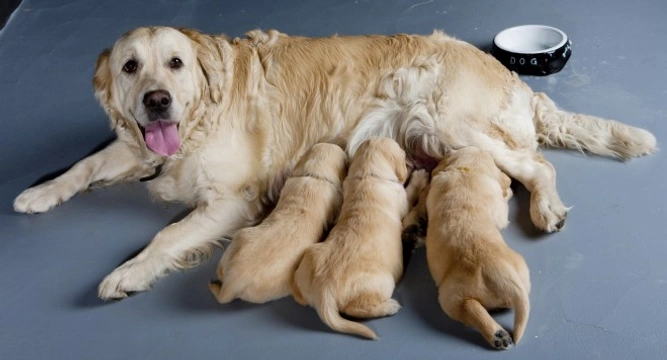
Can you increase a dam’s milk production?
If your dam is expecting puppies or you are researching the different stages of breeding from your dog, the milk production is one of the most important parts of the process, as this is what nourishes the puppies and helps them to grow and be healthy until they begin to move on to solid food!
As with most things pertaining to whelping and raising a litter, milk production is generally something that takes care of itself without any human intervention, just as it has been doing for millennia throughout the evolution of the modern dog. However, things can go wrong now and then, such as if the milk does not descend, the milk is too thin to nourish the pups, or not enough milk is produced to fulfil the demand of the young puppies. If this occurs, it can pose a problem to both the health of the dam and the litter, and you may have to take steps to correct the problem where possible. So, can you actually increase a dam’s milk production, and how? We will look into this in more detail within this article.
What causes low milk production?
A wide range of factors can lead to your dam either failing to produce milk entirely, or not producing enough milk. Some of the most common of these are:
- Malnutrition
- Dehydration
- A high worm count
- A uterine infection
- Hormone imbalances or lack of maternal hormone production
- Stress
- Premature delivery
- Mammary gland infections
What can you do if no milk is being produced?
A dam usually begins to produce colostrum, the nutritious fore-runner to milk, before the puppies are even delivered, and when she is in the process of delivering her pups, the production of the maternal hormone oxytocin should enable her milk to descend normally. Assuming that your dog is well fed and in generally good health when she is whelping, she will produce some milk, even if this is not enough, although you may need to help your dog to produce a sufficient amount to nourish her pups.
First of all, make sure that your dam has fresh, clean water available within easy reach, and offer both cool and warm water in case she has a preference! While your dam is unlikely to have become so dehydrated that her milk dries up without you knowing, this is the first course of action to take.
If your dam refuses to drink, try offering her warm, bland chicken soup, or a dog-suitable milk gently warmed to tempt her to lap, both to help with hydration and to get her strength up.
If your dog does not begin to drink or this is not the problem, you may need to call your vet out to check your dam over, and potentially have him give her a hormone shot to nudge the milk production along, assuming that there is not an underlying problem.
Allow the puppies to attempt to nurse, holding them up to the teats if they are unable to find them. The nursing process in itself may prompt the dam’s milk production, and the pups will benefit a little from the small amount of milk that is present while you try to resolve the problem.
If none of this works
While very few dogs will have serious problems with their milk production to the point that they are unable to nurse their puppies at all, if your dam is not producing milk or is not producing enough milk, you will need to supplementally feed the pups. This process can be challenging and time consuming, as the pups need to feed frequently around the clock, and so you may need to rope in friends or family for help, or consider having your dam and litter go for a stay at the vet’s clinic until the puppies are a few days old and less demanding.
Don’t feed the puppies cow’s milk, as this is not a suitable match for their needs and will be both too rich and lacking in the right nutrients for their young bellies.
Your vet will be able to sell you a suitable puppy milk formula to make up to feed the pups with, and this is again different to the puppy milk that you can buy in the supermarket, and matched to the needs of very young pups. Your pups will still benefit from being with the dam when they are tiny, even if they are not able to feed, so unless your dam is rejecting the litter, do not take them away from her.
Hand-feeding puppies takes a lot of time and patience, and your vet should show you how to do this correctly, as you will also need to stimulate the anal region of the pups after feeding to encourage them to toilet as well. However, after the first few days, the process should become somewhat easier!



